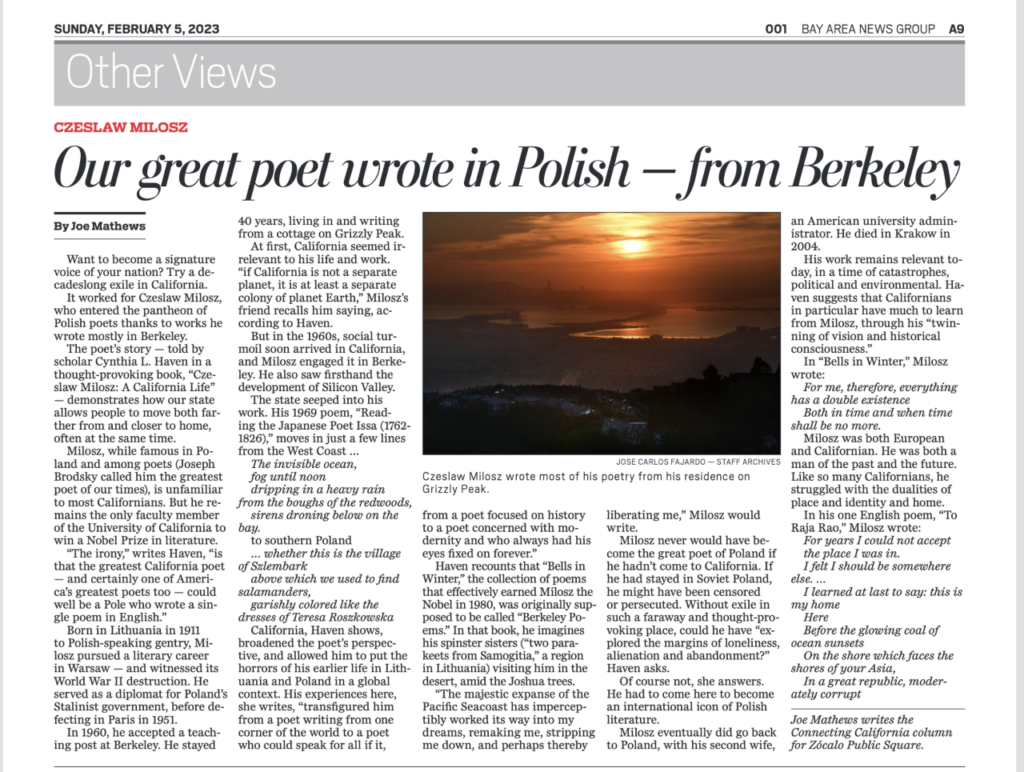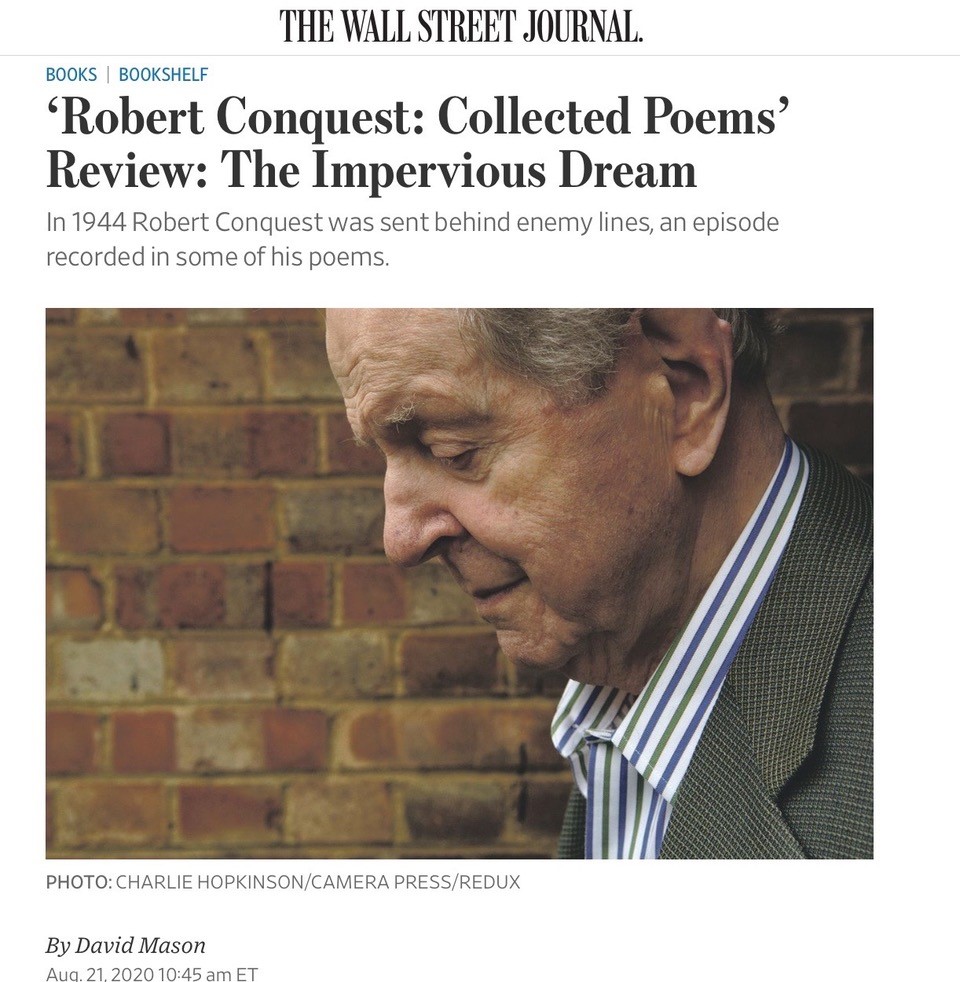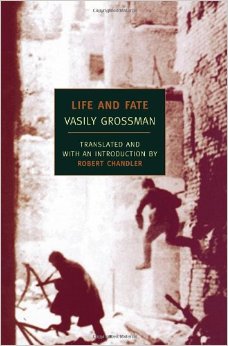
Conquest at work in his Stanford home (Photo: L.A. Cicero)
On a recent visit with Elizabeth Conquest (outdoors, six feet apart – pandemic style) she told me that her late husband, the eminent historian and poet Robert Conquest, admired the Roman emperor and philosopher Marcus Aurelius – so much so that he carried a slim volume of Meditations in his knapsack when he went off to war. I was glad to hear it; I had recently written about the Stoic thinker in the Book Haven here, and she had read it and appreciated it. Certainly Bob Conquest had some of the emperor’s superb psychological balance and equanimity.
 That’s something Marcus Aurelius had in common with the “Movement” poets of Britain in the 1950s – a group Conquest had founded and championed. The group included Philip Larkin, Kingsley Amis, Thom Gunn, and others. As the poet Dick Davis writes in “Robert Conquest’s Open Eyes” in The New Criterion:
That’s something Marcus Aurelius had in common with the “Movement” poets of Britain in the 1950s – a group Conquest had founded and championed. The group included Philip Larkin, Kingsley Amis, Thom Gunn, and others. As the poet Dick Davis writes in “Robert Conquest’s Open Eyes” in The New Criterion:
The Movement poets’ preference for an even tone, meticulous description, and a consciousness that is suspicious of its own emotional excesses whether positive or negative meant that a particularly venerable, and until then surely central, kind of poetry became something of no-go area for them. Most of the Movement poets wrote remarkably few love poems, and when love does appear in their poetry it is usually shadowed by irony. There are certainly poems about lust, flippantly cynical, as in Amis’s “Sight Unseen,” or brutally disillusioned as in Larkin’s “Deceptions,” but the revelation of a particular person as life’s be-all and end-all, the coup de foudre that makes the poet literally or at least metaphorically want to fall to his knees … not so much.
Marcus Aurelius’s Meditations didn’t discuss love, either. And that’s where Bob Conquest parts company with his colleagues and the emperor.
The occasion of Davis’s article, as well as the meeting with Liddie, is the – at last! finally! – publication of Conquest’s Collected Poems with Waywiser Press in London. It’s a beautiful, finely wrought 439-page volume, under the careful editorship of Elizabeth (a.k.a. Liddie) Conquest herself, for she is a gifted scholar in her own right, as well as the poet’s wife.
Conquest is best known for his groundbreaking work as a historian and author of The Great Terror, revealing the extent of Stalin‘s atrocities before the world wanted to know about it. We’ve written about that here. He is also known for his light verse, which the New Criterion article discusses as well. But relatively few have considered him as a poet of weightier verse. I did so in the Times Literary Supplement, and so has Dick Davis, a noted translator of Persian poetry. Few poets are more qualified to discuss Bob Conquest’s amorous poems – Dick has written some exquisite love poems himself.

Translator, poet Davis: a pretty good love poet himself
He writes: “The brutality of ‘fighting ideologies’ was the subject that much of his better known historical writing was to be concerned with, and it is also almost present as the context, whether alluded to or left unspoken, of his most personal lyrical verse, whose energy so often seems to be focused on the attempt to find or construct some kind of private haven of escape from, exactly, ‘the fighting ideologies.'”
Davis notes that Conquest “could write short, flip, catty poems about lust” with the best of them, but…
[T]here is a much more benign and fructifying erotic presence in many of his more substantial poems, a sense that erotic feeling is less a trap for the unwary than a welcome source of joy and mutual pleasure, one not to be questioned, at least in the moment that it is experienced.
At a lower level of intensity, it is notable, for example, how many of his early descriptions of foreign landscapes tend to have a young woman in them. There is almost a formula to such poems: a landscape is observed at a moment of tranquility in which the disasters of the public world (war and its desolate consequences, what he calls “the world of politics and rifles,” perhaps echoing E. M. Forster’s “outer life of telegrams and anger”) seem for a moment in abeyance, and this momentary sense of benign peace is concentrated on “a girl” who is with him, or glimpsed in the distance, or even merely imagined. Eros is present, as an undertow, a possibility, but certainly as a benign presence, an intimation of transformative consolation, if not quite of her overwhelming supervening of everything else. It is only one element in a complex scene, but it is the element around which hope and the possibilities of redemption from “the world of politics and rifles” are concentrated. For example, in a poem on being in Copenhagen with a lover, he writes that her presence with him

Liddie Conquest: a gifted scholar, too.
. gives the landscape form,
And is the immanence of every art …
A philosophy deriving from the calm
As you move into the center of my heart.
Below, his poem for his second wife … and after that, a poem that is not about love, but is a personal favorite (indulge me) about his friend George Orwell. And finally, a poem that will demonstrate why he is known for his light verse – his witty take on Mikhail Gorbachev.
A GIRL IN THE SNOW
for Tatiana Mihailova
Autumn’s attrition. Then this world laid waste
Under a low white sky, diffusing glare
On blurs of snow as motionless and bare
As the dead epoch where our luck is placed.
Till from the imprecise close distance flies,
Winged on your skis and stillness-breaking nerve
Colour, towards me down this vital curve,
Blue suit, bronze hair and honey-coloured eyes.
Under this hollow cloud, a sky of rime,
The eyes’ one focus in an empty mirror
You come towards my arms until I hold
Close to my heart, beyond all fear and error,
A clear-cut warmth in this vague waste of cold:
A road of meaning through the shapeless time.
GEORGE ORWELL
Moral and mental glaciers melting slightly
Betray the influence of his warm intent.
Because he taught us what the actual meant
The vicious winter grips its prey less tightly.
Not all were grateful for his help, one finds,
For how they hated him, who huddled with
The comfort of a quick remedial myth
Against the cold world and their colder minds.
We die of words. For touchstones he restored
The real person, real event or thing;
–And thus we see not war but suffering
As the conjunction to be most abhorred.
He shared with a great world, for greater ends,
That honesty, a curious, cunning virtue,
You share with just the few who don’t desert you,
A dozen writers, half-a dozen friends.
A moral genius. And truth-seeking brings
Sometimes a silliness we view askance,
Like Darwin playing his bassoon to plants;
He too had lapses, but he claimed no wings.
While those who drown a truth’s empiric part
In dithyramb or dogma turn frenetic;
–Than whom no writer could be less poetic
He left this lesson for all verse, all art.




















